Jeff Joyce
-
- Vessel Specific Training Via Adaptive Learning Experience Maritime Reporter, Mar 2013 #34
It is difficult and expensive to do vessel-specific training well. This is probably why, unlike certification training, it is under specified, and in many cases poorly implemented - often via job shadowing. But there is a technology which is an excellent tool for vessel-specific training, and every vessel operator should be aware of it. It is called adaptive learning. This article describes adaptive learning and examines one vessel operator’s deployment of it in order to facilitate vessel-specific training across its fleet of 35 vessels.
Certification training is well defined and regulated by the STCW and the various flag state regulations. Course lists are specified, course curricula are provided and even model courses are available to guide trainers.
However, there is another training component which is arguably just as important, yet it goes largely unregulated and is only minimally specified: vessel-specific training. Broadly speaking, vessel-specific training covers the unique combination of vessel characteristics, layout, equipment, and operating procedures and routines found on a vessel.
It has always been the case that crews needed to be deeply familiar with their vessels in order to operate them safely. But in recent years this need has become much more critical and urgent in light of the continuously increasing sophistication and complexity of modern vessel-based systems. Simply knowing how to operate these sophisticated systems is not sufficient. A deeper understanding is required in order to facilitate intelligent problem solving when the systems are not behaving as expected or, worse yet, when interactions between multiple sophisticated on-board systems produce unpredictable behaviours and outcomes. Crews must be armed with the knowledge necessary to make an informed analysis and arrive at a logical decision. It is the responsibility of each vessel operator to ensure this is so. However, this is much more easily said than done.
The Problem
For vessel operators, delivering standardized, comprehensive training of each vessel’s complex systems and procedures across their fleet can be a daunting task. To illustrate, let’s look at an example.
Consider a vessel operator which manages 50 vessels. These vessels are never uniform. There may be five different types of propulsion systems over the 50 vessels. Bridge equipment is not uniform. Fire fighting systems differ sometimes in their type and manufacturer, and differ always in their layout and implementation. Life rafts differ, marine evacuation systems differ, ship handling differs, and even the route that the vessel is currently operating on can require different reactions to an otherwise similar situation. The fact that each vessel differs from the others in some fundamental way means that the routines and procedures on board can never truly be the same. To further complicate matters, equipment, routines and training practice are all always in flux. So even if a training manual could be written for each vessel, it would be out of date in short order. So how can a vessel operator efficiently create, maintain and continuously improve a standardized, vessel-specific training program when the knowledge requirements vary so much from one vessel to another and changes and updates are an almost continuous necessity?
The answer is that many operators don’t do vessel-specific training particularly well. Instead, they resort to highly imperfect techniques such as job shadowing, sometimes combined with small amounts of classroom-based training. Fortunately, the technique of adaptive learning can provide a solution.
What is Adaptive Learning?
Adaptive learning is a computer-aided training technique designed to tailor each training instance to the needs of the individual trainee.
Although this may sound complex, it can be surprisingly simple and highly effective. In general, adaptive systems “learn” about each trainee and then adapt the learning content and interaction to fit him or her.
How can this be applied to vessel-specific training? The best way to illustrate is to look at how British Columbia Ferry Systems Inc. (BC Ferries) uses adaptive learning to provide vessel- and route-specific training across its 35 vessels serving 47 ports on 25 routes.
Adaptive Learning at BC Ferries
BC Ferries is leveraging adaptive learning across all operational lines of business (Deck, Terminals, Catering, and Engineering).
Taking a deckhand as a specific example at BC Ferries, the actual knowledge required will vary tremendously depending on the vessel and route combination within which the deckhand will be working. Specifically, there are several different types of knowledge required:
● Core knowledge: This is also referred to as “Fleet-generic knowledge” and is the same for all deckhands at BC Ferries. This includes company vision/mission/values, deckhand core competencies, safety, security and environmental policies and information.
● Vessel-specific knowledge: This is the required knowledge pertaining to the vessel that the deckhand will be operating on. It includes equipment on that vessel, procedures unique to that vessel, and so on. It consists of hundreds of pieces of knowledge, the combination of which will be unique to that vessel.
● Route-specific knowledge: This is the required knowledge pertaining to the route the deckhand will be operating on.
● Vessel-Route knowledge: This is knowledge required which is unique to the specific combination of vessel and route that the deckhand will be operating on. For example, operating procedures for the vehicle ramps at the various terminals will often differ based on which vessel is at the terminal.
Obviously for BC Ferries, as for any vessel operator, the creation and maintenance of custom training programs for every possible combination of job position, vessel and route would not be possible as it would number in the many thousands. Even if we took routes out of the equation, the number of distinct training programs required for every combination of job position and vessel would number in the hundreds, rendering their creation and continuous improvement not financially viable.
Instead, BC Ferries uses technology to provide the necessary training resources efficiently through adaptive learning. The trainee experience is now as follows. When an employee begins his or her training, BC Ferries’ learning management system (made by the company I work for) asks the employee to specify three pieces of information:
● What position they are training for,
● What vessel they will be operating on, and
● What route they will be operating on
With the answers to the questions above, the LMS assembles the required knowledge on demand and generates a customized, up-to-date, seamless, and cohesive learning package for that employee, in that position, on that vessel, while operating on that route. The effect is as though someone created, by hand, a learning program specifically targeted for that employee. These learning materials (available online or on paper) are now used to support comprehensive vessel-specific training for that employee at BC Ferries.
The same is true for assessments. When a test is about to be administered, the LMS asks for the position, vessel and route being trained. The examination is then created on demand to address the competencies and knowledge specific to that combination.
The Advantages of Adaptive Learning
For the Learner
The advantages of adaptive learning are reasonably self-evident for the learner. He or she is provided with a learning program which is specifically targeted at the knowledge needed. It is cohesive and seamless and does not require the trainee to judge whether this or that bit of information applies to their position while on their vessel and route. It all applies. More importantly, adaptive learning makes this kind of deep vessel-specific (and route-specific, in this case) training possible where otherwise it would be a practical impossibility.
For the Training Organization
(this is important …)
The advantages to the training organization are possibly even greater. Aside from the greatest benefit of improved training, adaptive learning creates efficiencies in learning content creation and maintenance - the same ones that make vessel-specific training possible. To understand them, a small bit of background is required.
When creating learning materials for an LMS which supports adaptive learning, one “learning module” is created for every “thing” that needs to be trained. For example, if in a fleet of 50 vessels there are three different ECDIS systems, then three modules are created for ECDIS training - one for each different ECDIS system. If four different RADAR units are dispersed across the fleet, then four modules are created for RADAR - one for each unit. This is replicated for the various equipment and procedures which need to be taught. When these modules are entered into the LMS database, they are tagged with the positions, vessels or routes (or any combination of the above) to which they apply. Now, as described above, when a learner specifies their position, vessel and route, the LMS software gathers all the relevant learning modules and, using a “framework”, assembles them into a customized training document which can be delivered to the trainee.
Now perhaps the advantages to the training organization become more clear. First, in a fleet of 50 vessels, it is not necessary to write a separate, complete training program for each vessel. Instead, each procedure or piece of equipment to be trained is documented only once in one small module, and then that module is tagged to indicate which vessels, positions, etc. it applies to. There is no redundant work required.
More importantly, maintenance of the courses is now very manageable. If a vessel has its ECDIS machine swapped out for another, all that is required is the changing of one tag in the LMS database to indicate which ECDIS machine now applies to that vessel. From that point on, training for that vessel will encompass the correct ECDIS machine. Likewise, if the training for one procedure or one class of ECDIS machine is updated to reflect some new information or an improved training approach, only that one learning module needs to be updated, no matter how many vessels or positions that one module is relevant to. From that point on, all trainees in positions or on vessels to which that learning module applies will immediately have the improved training experience. It is in this way that deep vessel-specific training is made possible and practical by an LMS which supports adaptive learning.
The BC Ferries Perspective
Adaptive learning has been an important tool in the implementation of BC Ferries new approach to training called the “Standardized Education and Assessment program”. According to Jeff Joyce, Director of Fleet Operations at BC Ferries:
“The Standardized Education and Assessment (SEA) program is a fundamental safety enabler from both the training and employee engagement perspectives.
Being able to easily tailor programs for each learner ensures relevant, precise and targeted teaching is taking place. This, coupled with equally surgical examination questions and processes ensures that the learner, upon successful completion of the multi-modal clearance process, is fully capable of safely carrying out his or her duties and thereby provides real value to the greater team. Viewed from a different perspective, the Master looking at his or her teams on the bridge and at the mooring stations can be confident that all deckhands who have gone through this program have had equal opportunity to learn all requisite knowledge. The larger team also collectively knows that the SEA graduates have proven to themselves and their shipmates that they have the knowledge (and equally important, the confidence) to proactively participate in all evolutions, be they routine or unforeseen.
The corollary benefit of BC Ferries SEA program, which so ably leverages adaptive learning, is that the maintenance and upkeep of the program is actually completed by the vessel subject matter experts (SMEs), thereby sustaining the engagement of these employees on the deck plates - the SMEs are enabled to keep the material relevant and then reap the rewards of their efforts by working side-by-side with their shipmates who have completed SEA training. This process of quality training material being delivered and maintained by SMEs results in confident, capable graduates. These new teammates frequently become engaged trainers themselves once they’ve honed their knowledge and skills with experience...resulting not only in an almost self-sustaining cycle of training success, but more fundamentally, safer operations and enhanced customer service.”
Conclusion
The advantages of adaptive learning to maritime industry training cannot be overstated. Properly applied, it makes vessel-specific training not only possible, but also highly practical and sustainable where previously it was neither. Given the importance of vessel-specific training in this era of ever increasing complexity of vessel systems and procedures, this technique is one which is critically important now and will only increase in utility and applicability as time marches on.(As published in the March 2013 edition of Maritime Reporter & Engineering News - www.marinelink.com)
-
- SailSafe: A SEA Change for the Better Marine News, Jan 2016 #24
very high. Critical thinking and objectivity, as well as collaborative planning and communication skills have all been honed through SEA. The Authors Jeff Joyce is BC Ferries’ Director of Fleet Operations and has been the SEA Project Owner since its inception in 2008. Murray Goldberg is CEO of Marine
-
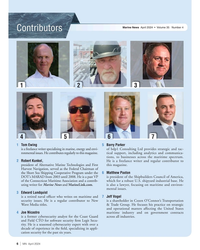 )
April 2024 - Marine News page: 6
)
April 2024 - Marine News page: 6.com. is also a lawyer, focusing on maritime and environ- mental issues. 3 Edward Lundquist is a retired naval of? cer who writes on maritime and 7 Jeff Vogel security issues. He is a regular contributor to New is a shareholder in Cozen O’Connor’s Transportation Wave Media titles. & Trade Group
-
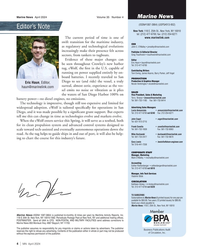 )
April 2024 - Marine News page: 4
)
April 2024 - Marine News page: 4, eWolf, the ? rst in the U.S. capable of Contributing Writers running on power supplied entirely by on- Tom Ewing, James Kearns, Barry Parker, Jeff Vogel board batteries. I recently traveled to San PRODUCTION Production & Graphics Manager Diego to see (and ride) the vessel, a truly Eric
-
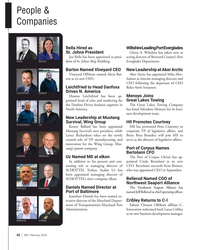 )
February 2024 - Marine News page: 42
)
February 2024 - Marine News page: 42sister company elkon. Northwest Seaport Alliance Daniels Named Director at The Northwest Seaport Alliance has Menoyo Courtney Port of Baltimore named Jeff Bellerud as chief operating of? cer. Jonathan Daniels has been named ex- ecutive director of the Maryland Depart- Cribley Returns to C-I ment of Transportat
-
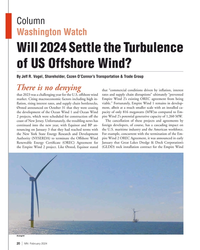 )
February 2024 - Marine News page: 20
)
February 2024 - Marine News page: 20Column Washington Watch Will 2024 Settle the Turbulence of US Offshore Wind? By Jeff R. Vogel, Shareholder, Cozen O’Connor’s Transportation & Trade Group There is no denying that “commercial conditions driven by in? ation, interest that 2023 was a challenging year for the U.S. offshore wind rates and
-
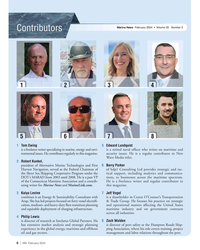 )
February 2024 - Marine News page: 6
)
February 2024 - Marine News page: 6and a contrib- He is a freelance writer and regular contributor to uting writer for Marine News and MarineLink.com. this magazine. 3 Kaiya Levine 7 Jeff Vogel combines is an Energy & Sustainability Consultant with is a shareholder in Cozen O’Connor’s Transportation Arup. She has led projects focused
-
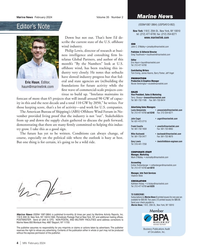 )
February 2024 - Marine News page: 4
)
February 2024 - Marine News page: 4wind, has been tracking this in- Contributing Writers dustry very closely. He notes that setbacks Tom Ewing, James Kearns, Barry Parker, Jeff Vogel have slowed industry progress but that fed- PRODUCTION Production & Graphics Manager eral and state agencies are (re)building the Eric
-
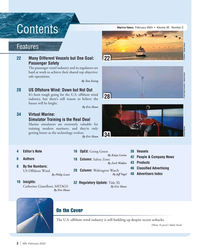 )
February 2024 - Marine News page: 2
)
February 2024 - Marine News page: 2Zach Walden 8 By the Numbers: 46 Classi? ed Advertising 20 Column: Wahington Watch US Offshore Wind 48 Advertisers Index By Jeff Vogel By Philip Lewis 10 Insights: 32 Regulatory Update: Title XI Catherine Gianelloni, MITAGS By Eric Haun By Eric Haun On the
-
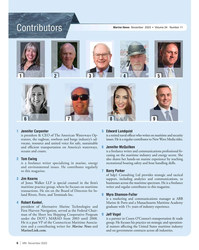 )
November 2023 - Marine News page: 6
)
November 2023 - Marine News page: 6graduate with 15+ years of industry experience. First Harvest Navigation, served as the Federal Chair- man of the Short Sea Shipping Cooperative Program 9 Jeff Vogel under the DOT’s MARAD from 2003 until 2008. is a partner in Cozen O’Connor’s transportation & trade He is a past VP of the Connecticut Maritime
-
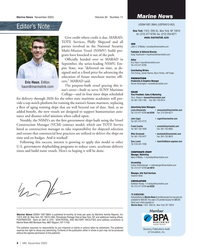 )
November 2023 - Marine News page: 4
)
November 2023 - Marine News page: 4State, was “delivered on time, as de- Contributing Writers signed and at a ? xed price for advancing the Tom Ewing, James Kearns, Barry Parker, Jeff Vogel education of future merchant marine of? - PRODUCTION Production & Graphics Manager cers,” MARAD said. Eric Haun, Editor, Nicole Ventimiglia
-
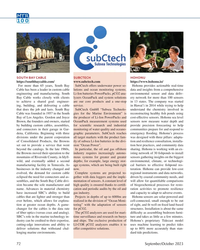 )
September 2023 - Marine Technology Reporter page: 72
)
September 2023 - Marine Technology Reporter page: 72MTR 100 SOUTH BAY CABLE SUBCTECH HOHONU https://southbaycable.com/ www.subctech.com https://www.hohonu.io/ For more than 65 years, South Bay SubCtech offers underwater power so- Hohonu provides actionable real-time Cable has been a leader in custom cable lutions and ocean monitoring systems. data and
-
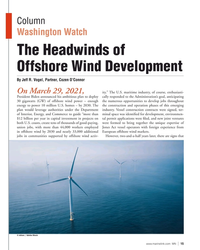 )
October 2023 - Marine News page: 15
)
October 2023 - Marine News page: 15Column Washington Watch The Headwinds of Offshore Wind Development By Jeff R. Vogel, Partner, Cozen O’Connor On March 29, 2021, ity.” The U.S. maritime industry, of course, enthusiasti- President Biden announced his ambitious plan to deploy cally responded to the Administration’s goal, anticipating
-
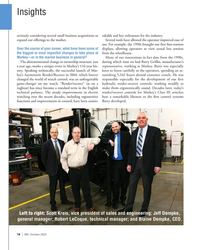 )
October 2023 - Marine News page: 14
)
October 2023 - Marine News page: 14systems functions and improvements in control, have been unmis- Barry developed. Left to right: Scott Kreis, vice president of sales and engineering; Jeff Dempke, general manager; Robert LeCoque, technical manager; and Blaine Dempke, CEO. 14 | MN October 202
-
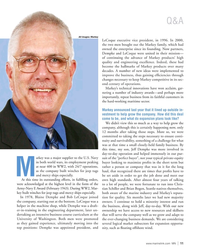 )
October 2023 - Marine News page: 11
)
October 2023 - Marine News page: 11to ensure conti- nuity and survivability, something of a challenge for what was at that time a small closely-held family business. By this time, my son, Jeff Dempke was more involved in day-to-day operation and helped immensely in our pur- arkey was a major supplier to the U.S. Navy suit of the “perfect
-
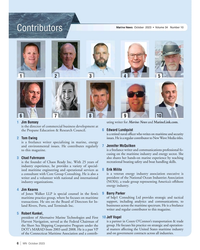 )
October 2023 - Marine News page: 6
)
October 2023 - Marine News page: 6spectrum. He is a freelance writer and regular contributor to this magazine. 5 Robert Kunkel, president of Alternative Marine Technologies and First 10 Jeff Vogel Harvest Navigation, served as the Federal Chairman of is a partner in Cozen O’Connor’s transportation & trade the Short Sea Shipping Cooperative
-
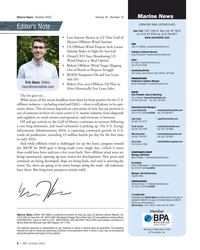 )
October 2023 - Marine News page: 4
)
October 2023 - Marine News page: 4212-477-6700 • Biden’s Offshore Wind Target Slipping Out of Reach as Projects Struggle Contributing Writers Tom Ewing, James Kearns, Barry Parker, Jeff Vogel • BOEM Postpones Oil and Gas Lease PRODUCTION Sale 261 Production & Graphics Manager Eric Haun, Editor, Nicole Ventimiglia • nicole@marin
-
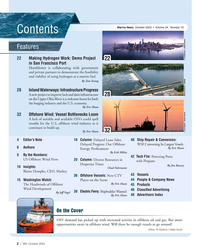 )
October 2023 - Marine News page: 2
)
October 2023 - Marine News page: 2Eric Haun The Headwinds of Offshore 45 Products Wind Development 46 Classi? ed Advertising 38 Electric Ferry: Shipbuilder Wanted By Jeff Vogel 48 Advertisers Index By Eric Haun On the Cover OSV demand has picked up with increased activity in offshore oil and gas. But more opportunities
-
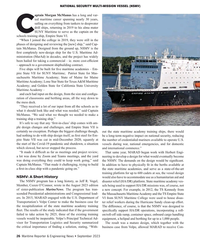 )
September 2023 - Maritime Reporter and Engineering News page: 26
)
September 2023 - Maritime Reporter and Engineering News page: 26at sea, the vessel design NSMV: A Short History would also have to accommodate use as a humanitarian aid and The NSMV program has a long history, as Jeff R. Vogel, disaster relief (HA/DR) platform. State maritime academy ves- Member, Cozen O’Connor, wrote in the August 2023 edition sels being used to
-
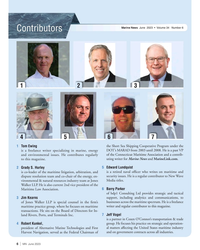 )
June 2023 - Marine News page: 6
)
June 2023 - Marine News page: 6maritime writer and regular contributor to this magazine. transactions. He sits on the Board of Directors for In- land Rivers, Ports, and Terminals Inc. 7 Jeff Vogel is a partner in Cozen O’Connor’s transportation & trade 4 Robert Kunkel, group. He focuses his practice on strategic and operation- president
-
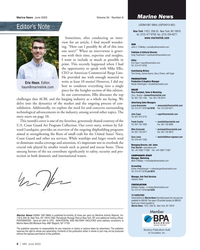 )
June 2023 - Marine News page: 4
)
June 2023 - Marine News page: 4212-477-6700 the opportunity to speak with Mike Ellis, Contributing Writers CEO at American Commercial Barge Line. Tom Ewing, James Kearns, Barry Parker, Jeff Vogel He provided me with enough material to PRODUCTION Production & Graphics Manager write at least 10 stories! However, I did my Eric Haun
-
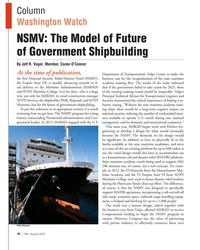 )
August 2023 - Marine News page: 16
)
August 2023 - Marine News page: 16Column Washington Watch NSMV: The Model of Future of Government Shipbuilding By Jeff R. Vogel, Member, Cozen O’Connor At the time of publication, Department of Transportation’s Volpe Center to make the the ? rst National Security Multi-Mission Vessel (NSMV), business case for the recapitalization of
-
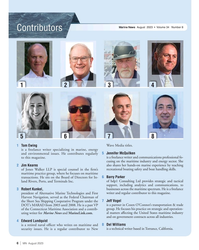 )
August 2023 - Marine News page: 6
)
August 2023 - Marine News page: 6and regular contributor to this magazine. Harvest Navigation, served as the Federal Chairman of the Short Sea Shipping Cooperative Program under the 7 Jeff Vogel DOT’s MARAD from 2003 until 2008. He is a past VP is a partner in Cozen O’Connor’s transportation & trade of the Connecticut Maritime Association
-
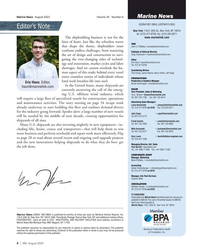 )
August 2023 - Marine News page: 4
)
August 2023 - Marine News page: 4. And we cannot overlook the hu- Contributing Writers man aspect of this trade; behind every vessel Tom Ewing, James Kearns, Barry Parker, Jeff Vogel exists countless stories of individuals whose PRODUCTION Production & Graphics Manager hard work breathes life into steel. Eric Haun
-
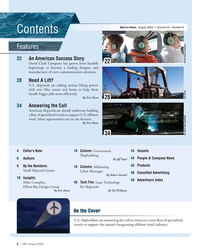 )
August 2023 - Marine News page: 2
)
August 2023 - Marine News page: 2Eric Haun David Clark Company 34 4 Editor’s Note 16 Column: Government 43 Vessels Shipbuilding 6 Authors 44 People & Company News By Jeff Vogel 45 Products 8 By the Numbers: 18 Column: Addressing Small Shipyard Grants Labor Shortages 46 Classi? ed Advertising By
-
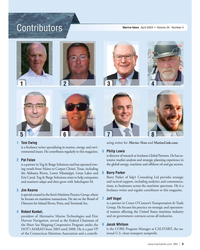 )
April 2023 - Marine News page: 5
)
April 2023 - Marine News page: 5to this magazine. is special counsel in the ? rm’s Maritime Practice Group, where he focuses on maritime transactions. He sits on the Board of 7 Jeff Vogel Directors for Inland Rivers, Ports, and Terminals Inc. is a partner in Cozen O’Connor’s Transportation & Trade Group. He focuses his practice
